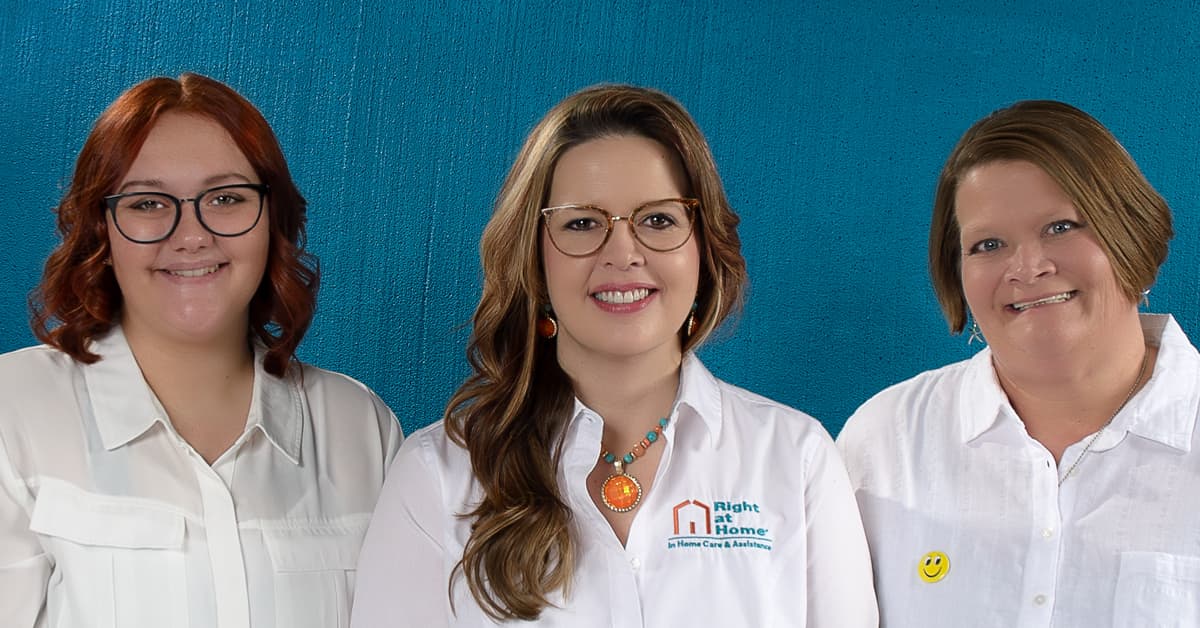

Benefits of Home Care for Adults With Functional Needs
In the picture: Kyla Agnew, Care Manager; Sandra Bullock; Owner of Right at Home Lima; Lexi Archer, Program Director. (Left to Right)
Sandra Bullock spent 11 years of her career working as a registered nurse in long-term care, skilled nursing and hospice facilities. When she decided to start her own business, launching an in-home care agency to serve the needs of seniors seemed to be a no-brainer.
She opened Right at Home Lima in 2016 to serve the elders in her community, but her business’s services soon expanded to cover care for adults with functional needs, as well.
Serving Adults With Functional Needs in Lima, Ohio
Individuals with functional needs may have physical, developmental, behavioral/emotional, and/or sensory-impaired limitations to their abilities1 that hinder one or more life activities.
In March 2018, Bullock met Karl Beaucamp, a compassionate caregiver with functional needs. Before Right at Home, Beaucamp had worked in the fast-food industry. Bullock saw something in him and recruited him to the care team.
Beaucamp on the other hand, appreciated the opportunity and embraced his new role as a caregiver. After finishing the mandatory training from Right at Home, Beaucamp took a state-run autism-training course to further his skills. His motivation inspired Bullock to expand the support her agency provides to include adults with functional needs in Allen County and surrounding areas in Lima, Ohio.
Home Care for Adults With Developmental Disabilities
Developmental disabilities refer to chronic conditions that usually manifest before age 22. These conditions can include autism, Down syndrome, seizure disorders, cerebral palsy, and visual and intellectual disabilities.
Family members often serve as the primary caregivers of their loved ones with developmental disabilities. Although supplementary help from in-home caregivers may empower some of these individuals to live a relatively independent life, many of their parents find it hard to entrust that care to others.
“Families are primarily concerned about finding the caregivers who are the most qualified,” says Kyla Agnew, Care Manager of Right at Home Lima. “We understand that worry and are committed to matching the client’s needs with the caregiver’s skills. Our caregivers are required to complete an eight-hour Relias training course specifically related to clients with disabilities.”
Right at Home Lima also has a care-finder system with detailed records of each caregiver’s background and training. “The care-finder system helps us match clients with the caregivers who are the most compatible,” Agnew continues.
Typically, case managers, families and guardians of adults with developmental disabilities are the ones who take the initiative to establish service with Right at Home, but there are also those who seek home care assistance with the agency because they have aged-out of work programs.
Empowering Adults With Developmental Disabilities

While there are many organizations dedicated to helping the parents of children with functional needs, there seems to be little support and advocacy for adults with functional needs.
“Many of our clients attended workshops where they learned to build their independence by earning a wage,” Agnew says. “When they graduate from these programs, they move on to join day habilitation programs that provide long-term personal and social development opportunities.”
Day habilitation programs are separate from the residences of individuals with developmental disabilities. For participants who need extra help with their activities of daily living, support from in-home caregivers comes in handy.
“A bit of help with personal care can go a long way,” says Bullock. “It can mean the difference between living independently and residing in a facility. Our clients are like our friends and families. We support them to pursue their dreams and aspirations.”
1 Garcia, L. (2018, June 21). Special needs: Defining and understanding the 4 types. Retrieved from https://www.care.com/c/stories/15245/types-of-special-needs/.



